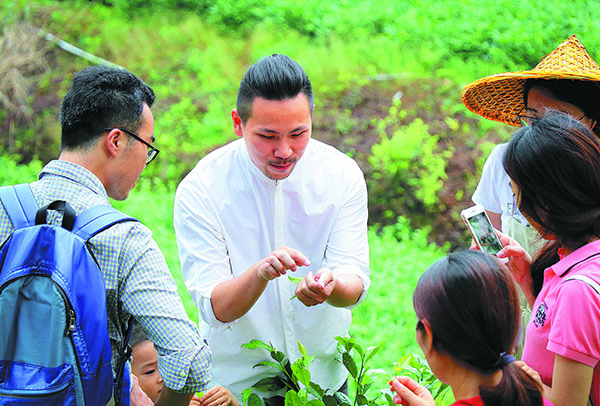Celebrating tea on 'Alishan Mountain of the mainland'


Chen Yun-chia, a young man from Taiwan, has left his cushy job with a high-tech enterprise on the island and crossed the Strait to continue a family tradition of running a tea plantation in his grandfather's hometown in Fujian province.
The plantation, situated in a special tea park for investors from Taiwan in Zhangping's mountainous area, provides visitors with an opportunity to explore tea-making and nature.
With a breathtaking view of the stars, ocean of clouds, mountains and clean air, the Yueshan Tea Estate has become a popular tourist destination during holidays.
Chen, 39, was born in Taiwan and grew up there. He recalls how when he was a child his late grandfather, Chen Yueshan, a calligrapher in Taiwan, took him to visit relatives on the mainland. Those visits are part of his childhood memories of the mainland.
His grandfather had left his hometown in Fujian in 1948, to work as a teacher in Taiwan. However, because of the sudden rise in cross-Strait tensions, he was unable to return to the mainland until the late 1980s when visits between the two sides of the Strait resumed.
"Grandpa would return to visit his mother during festivals and her birthdays every year. He wanted to make up for the lost 40 years," Chen said.
At the age of 7, Chen followed his grandfather and parents to visit their hometown, Zhangping, and found that he had many family members in Fujian. "I learned from my grandfather that one cannot forget his roots," Chen said. He remembers how his grandfather would donate money to repair ancestral halls in their hometown, start schools and set up scholarships there.
In 2005, the patriarch asked Chen's father to move to Zhangping and invest in a tea plantation there. In July 2006, Zhangping launched a pilot park for farmers from Taiwan to attract investment, and Chen's father was among the first batch of investors to grow high-mountain tea there.
After years of efforts in opening up the barren hills, cultivating tea and building facilities to process the leaves, the newcomers, like Chen's father, struck roots in the once-backward area that is now dotted with green terraced tea gardens.
The first generation of planters succeeded in growing oolong tea in areas on the mainland where the climatic conditions are similar to those in Alishan Mountain, a major oolong tea-producing area in Taiwan; locals even call it the "Alishan Mountain of the Chinese mainland". Now, the younger generation, mostly children of the pioneers, is gradually taking over the local tea industry.
When Chen visited his father in 2015, he was moved by the environment and people. He quit his job in Taiwan and settled down on his father's tea plantation to continue the work.
Chen's father would spray pesticides on the plantation, but Chen, a graduate of the National Taipei University of Technology with a major in environmental protection, insists on not using pesticides or herbicides.
"We had some differences on the issue, and my father feared we would lose customers," he said. But Chen persisted until his father gave in. The tea Chen grows is favored by more customers, and its sales have hit new highs.
"I want to grow natural and healthy tea. The output is only one-tenth of that before, but the price has increased accordingly," he said.
Unlike the older generations who stuck to growing tea, Chen has a grander idea — to create a cultural, leisure, and tourism tea plantation where visitors can experience tea culture, enjoy nature, and get away from their busy lives.
He has converted his tea plantation into a sightseeing destination with accommodations to attract more tourists from both sides of the Strait, offering a serene, rustic tea experience that allows travelers to escape the hustle and bustle of city life.
Chen has converted the old premises into a hotel, tea house, sightseeing farm, and cultural space where visitors can enjoy scenic views of the tea plantation, pick tea leaves, make tea, taste tea, and learn about tea culture.
Visitors can often be seen on the plantation wearing tea-picking costumes and carrying small bamboo baskets to collect the leaves in. The plantation is also a popular destination for school field trips and corporate team-building exercises.
In summer, visitors also get the rare opportunity of seeing fireflies. It is to protect these small insects that Chen avoided the use of pesticides, turning the plantation into a firefly paradise.
He said that the rural vitalization project on the mainland provides a broad platform for young people from Taiwan.



































